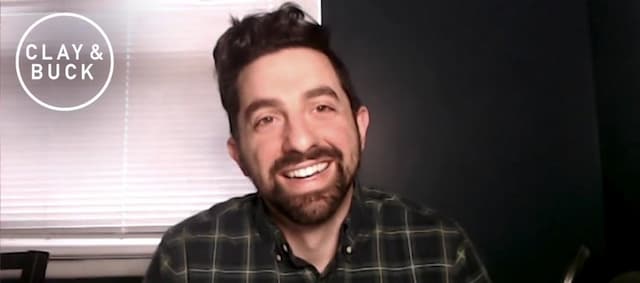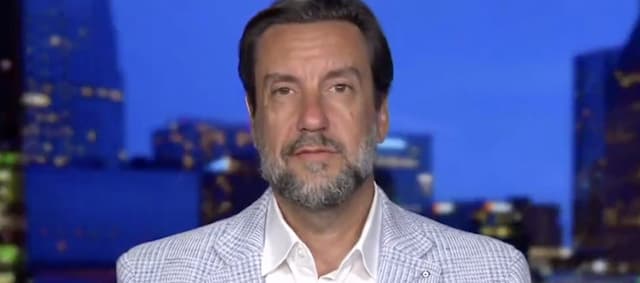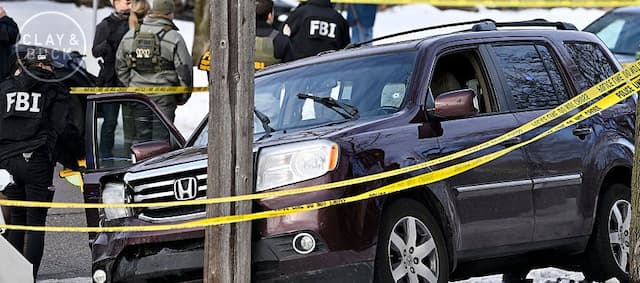Nolan Peterson Reports from on the Ground in Ukraine
BUCK: Will there be a war in Ukraine? The whole world is wondering about this one right now given all the news coverage of it. It seemed like it was imminent and then it wasn’t, then it was backing down. But is it? Our friend Nolan Peterson is with us now. He is a veteran of the U.S. Armed Forces. He’s now a journalist in Ukraine. He joins us from on the ground in that country, and he is a correspondent for Coffee or Die Magazine. Nolan, thanks for being with us.
PETERSON: Thank you for having me.
BUCK: You gotta tell us, man, what is the state of play right now? Because a couple of days ago news reports in the U.S. were there was gonna be an invasion Wednesday. As of yesterday, it was actually Putin’s moving away from it; looks like there’s not gonna be a war. What’s happening in Ukraine?
PETERSON: Right. So, after months of buildup, Russia now has enough military firepower on Ukraine’s borders to execute sort of the worst-case scenario, which is a country-wide invasion, possibly encirclement of Kiev, most likely preceded by waves of air strikes and missile attacks that inflict massive casualties on Ukraine’s military right off the bat, like a Desert Storm-type of conflict is what we’re looking at.
The U.S. intelligence community I think determined, based on whatever intelligence they have available that by today, Russia was ready to attack. Whether or not today was D-Day or not, I don’t think anybody knows. But today is the day that they are capable of executing the attack. There have been reports from Moscow that they’ve started to pull back from troops.
But today NATO, the U.S., and multiple open-source intelligence observers say that Russia is actually increasing its military forces around Ukraine. So, I think we are in the danger period right now. The buildup phase of this is over. The waiting game has begun. And so now Russia’s tactic effectively is to just cloud the information space with is much confusion as possibly to make us not know what’s coming next and make us second-guess our assumptions — and also to have the element of surprise.
 We know that they are poised to attack. We do not know when. There is, of course, always the possibility that Putin could walk this back, decide to change course. But at the moment, we have to take this deadly seriously because Russia does have the firepower in place to execute what would effectively be the largest land invasion in Europe since World War II.
We know that they are poised to attack. We do not know when. There is, of course, always the possibility that Putin could walk this back, decide to change course. But at the moment, we have to take this deadly seriously because Russia does have the firepower in place to execute what would effectively be the largest land invasion in Europe since World War II.
CLAY: Nolan, when I think about living in Ukraine, I can’t imagine what it feels like to have this potentially hanging over your head. What does it feel like in Kiev and throughout Ukraine as the possibility of this invasion looms? What is it like in the streets? What does it feel like among the populace? What are you seeing? Is there a palpable fear, or do people seem to believe it’s not going to happen?
PETERSON: Yeah. So an analogy I use quite often recently is that I grew up in Florida, and this really reminds me of those days right before a major hurricane is about to hit where you try to decide, “Do I stay, do I flee, what do I do? Do I go out and buy a bunch of canned food? Do I fill the bathtub up with water?” And people are trying to make these decisions. It’s surreal.
I watched the movie Schindler’s List (chuckles) last night, and I just feel like we’re living through this moment that you just can’t believe that this is happening in 2022. You know, here, a European capital some three to four million people, families are making decisions like, “Do I become a refugee in the middle of winter? Do I stay put and ride out a potential Russian bombing attack?”
Or many people have decided to take up arms and potentially fight should Russia invade. So it’s really an extraordinary moment. You see life basically going on as normal here in Kiev? What choice do people have but to go on about their lives? And I think that many Western journalists get it wrong a little bit when they see life going on and they think, “Oh, well, the people here don’t take it seriously.” But remember this country has been at war for eight years already.
 Russia invaded this country in 2014. So the people here, they’re a little bit desensitized, I’d say, to the threat of violence ’cause they lived with war in their country now since 2014. As an American, I can say, too, that the Ukrainian culture is not a culture where they wear their emotions on their sleeves like we do in America. So and their stoic nature as they endure this very tough situation is quite impressive.
Russia invaded this country in 2014. So the people here, they’re a little bit desensitized, I’d say, to the threat of violence ’cause they lived with war in their country now since 2014. As an American, I can say, too, that the Ukrainian culture is not a culture where they wear their emotions on their sleeves like we do in America. So and their stoic nature as they endure this very tough situation is quite impressive.
And I have to say too, the way civil society is stepping up and preparing civilians for the war is amazing, you know, you see a nation of people who are not waiting for their government to save them. And as an American, especially an American veteran, I say I’m quite impressed and inspired by what I’ve been seeing here in Ukraine recently.
BUCK: Nolan… We’re speaking to Nolan Peterson. He is on the ground in the capital of Ukraine, in Kiev, and, as he says” The calm before what may be the storm of a major Russian invasion. Maybe. We don’t know. Nolan, to that point, what would Putin possibly get out of this such that it would have been worth it to gather, what, over 130,000 troops in preparation for really a three-pronged invasion if he wants it, and then nothing? What could he get? What is the prize that would keep him from going in?
PETERSON: Right. So I think right now, some have subscribed to the notion this is all bluff. I would say, “What has he achieved at this point to justify his bluff, right?” NATO is certainly more united. Ukraine has been receiving waves of weapons from its Western partners — and the Ukrainian people, they are resolutely steadfast in their commitment to democracy and their Western trajectory away from Russia.
So I’d say that Russia, besides creating chaos, has really achieved nothing. All these speculations about what this attack will look like, right — whether it’s gonna be another so-called hybrid war or a land bridge to Crimea or whatnot. And I have a bit more pessimistic viewpoint ’cause I think that Russia or the Kremlin isn’t looking for a land bridge to Crimea. They’re not looking for another gray zone war.
They’re looking to fundamentally reverse Ukraine’s trajectory toward the West. And if that’s Moscow’s goal, then they’re not going to achieve that with some “little green men” attack in the east. That will require an attack on Kiev to change the government. And so I think that’s why we should be really concerned, because Moscow’s intent here is to fundamentally reverse Ukraine’s Western trajectory. And so that I think telegraphs the type of conflict we’re looking at. And that maximalist aim certainly signals a very, very significant military action.
CLAY: Nolan, how will the Ukrainian people react, not only the military…? You mentioned sort of a Gulf War style invasion. What we saw in Iraq was of many of the soldiers basically threw down their weapons and refused to do the battle for Saddam Hussein. How committed do you think the Ukrainian people are to resisting this Russian attack in the event it comes?
PETERSON: That’s a good point, and I think as an American veteran who I served in both Iraq and Afghanistan, where we were prodding societies to embrace the notion that democracy, right? But this is a country that chose democracy on their own eight years ago, and they have fought tooth and nail for the last eight years to keep those dreams alive. They’re not fighting…
 Ukraine, they’ve not for the past eight years in Donbass to join NATO. They’re fighting to remain a sovereign country, to choose their own destiny, to be a free country, free from Russian oppression. And so I think that many Ukrainians see this as an existential fight, a fight that their fathers and forefathers have been fighting for generations — during the Soviet period in the nineties — to get rid of this Russian malign influence over their society.
Ukraine, they’ve not for the past eight years in Donbass to join NATO. They’re fighting to remain a sovereign country, to choose their own destiny, to be a free country, free from Russian oppression. And so I think that many Ukrainians see this as an existential fight, a fight that their fathers and forefathers have been fighting for generations — during the Soviet period in the nineties — to get rid of this Russian malign influence over their society.
And so I have no doubt, based on what I’ve seen, that if the Ukrainian regular military is defeated on the field of battle, the Ukrainian nation will step up and continue the fight. My 57-year-old father-in-law has vowed to take up arms and fight. He’s a former Soviet army soldier, and he’s gonna fight against Russians if they come into their hometown. So I have no doubt that the Ukrainian nation is prepared to wage insurgency.
That said, however, insurgencies aren’t things that happen overnight. You don’t flip on a switch and suddenly have an insurgency ready to rock. So I think that would take time, and I think that a major Russian attack will likely be extraordinarily violent and fast, and it may inflict such an amount of damage on Ukraine’s infrastructure and military that Russia could achieve its goals in such a short time that the insurgency wouldn’t have time to take root.
BUCK: Nolan, please stay safe out there, man. We’ll have you back. Nolan Peterson, senior editor Coffee or Die Magazine. Clay?
CLAY: That was fantastic. Thank you, my man.





